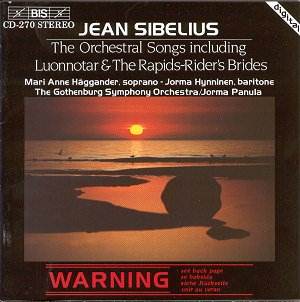Another super CD from BIS, this time a selection of
the orchestral songs of Jean Sibelius.
Wagner was the greatest in this genre and Wagnerís
influence can be heard in these Sibelius songs. The other great orchestral
song writers were Max Reger and Hans Pfitzner. Perhaps the greatest
orchestral song cycle is Richard Straussís Four Last songs, sublime
music indeed.
It is my view that we have a dearth of good male singers
worldwide. But I have to say that the baritone here, Jorma Hynninen,
is undeniably first class. Born in Finland he won the Finnish Singing
Competition in 1969 and made his concert debut in 1970. I wish the sleeve
notes gave more details of his operatic roles. He is a baritone that
is neither light nor heavy but has a well judged voice.
Mari-Anne Haggänder is also good but does not
possess the tenderness of Hynninen. Her top register is gloriously clear
and, in a good sense, piercing and clear like a Nordic winter. She has
sung Eva in Wagnerís The Mastersingers and Mimi in La Bohème.
Jorma Panula is now 71 and is very versatile. He conducts
these songs quite expertly and the recording is of excellent sound.
Sibelius was into nature and was a pantheist. He believed
in the many gods of nature. He was interested in the poetry of Erik
Johan Stagnelius of which the opening Serenade is an example.
It has a glorious sound recalling Wagner. The baritone is strong but
in a very tender way. The constant changes of time signature add to
the interest.
The Song of the Cross Spider Op 27:4 is the
only vocal item in Adolf Paulís play for which Sibelius wrote his King
Christian II Suite. The spider, sung by the jester, is a portrait
of evil. I prefer Monica Groopís performance but have to say that the
orchestral version adds colour to this memorable song.
On a balcony by the sea is one of Sibeliusís
sparse songs. The words are by another favourite poet Viktor Rydberg.
It is almost operatic in design with an opening recitative passage.
It is another nature poem and the climax, albeit brief, is staggering
and worth waiting for.
The setting of Shakespeare is a popular choice for
composers and Sibelius turned to Twelfth Night for Come Away Death,
a symphonic song rooted in G sharp minor. It is sombre but very
telling and here Hynninen is at his best. It is a really beautiful song
and certainly captures the mood to perfection.
Another choice song is The Diamond in the March
Snow. It has a gentle sparkle in a spacious utterance. Again the
vocal line is memorable and the song has a patriotic feel about it.
Listen to the singerís care over every nuance. It is sad and nostalgic
but with a quiet confidence and is very tender
The highlight of the disc is The Rapid-Shooters
Bride, a ballad for baritone (or mezzo) and orchestra. Wilhelm,
the rider of the rapids, takes his bride, Anna, with him to ride the
rapids but the boat is torn asunder and the lovers disappear in the
swirling foam. The orchestration, still recalling Wagner, also hints
at the Lemminkainen ballads and the first two symphonies, faultless
and full of colour. The drama is wonderfully caught here and even in
passages where nothing is happening there is great expectation. The
swirling waters and rain are transferred into orchestral sound which
is nothing short of breathtaking. The sinister recurring four note brass
theme spells disaster. Marvellously sung and brilliantly brought off.
The soprano takes over for the final items. Sunrise
also begins with a recitative passage. it is another sparse song
being rather desolate. The stillness is well portrayed and Hägganderís
melisma is very good. Eventually the world awakes and the superb top
notes pierce the forbidding snow (a tremendous moment). The Wagner influence,
particularly Isolde, is here. It is a strangely satisfying song. This
is followed by And I questioned them no further, a song
of charm and lost love. Again Wagner is not far away and we expect the
Rhinemaidens at any moment.
Arioso is a wonderful song. One could be forgiven
for thinking one is in church with the sounds as if of an organ and
a simple processional hymn. The distant timpani give it an eerie feel
in a song which is sung with great sensitivity.
The girl went out one winter morning
In the misty covered meadow
Saw a faded rose and said:
Weep not, weep not, dearest flower
That your fairest time is over,
You have loved and you have enjoyed
You have known your spring and pleasure.
'Ere the winter cold could reach you
A far worse fate my heart has found
To both at once both spring and winter.
My own boyís eye its day in spring
And my motherís is its winter
Weep not, dearest flower,
That your fairest time is over.
Two other songs need no comment and the disc ends with
the tone poem for soprano and orchestra, Luonnotar, Op. 70 from
the Finnish national epic, the Kalevala. I have also noted the similarity
between this and James Joyce's Finnegan's Wake and the whole
idea that there is no God and that nature itself is the creator and
giver of all life, which is an evolution dogma.
It is a good piece. The wonderful clarity of the voice,
particularly at climaxes, is excellent and while many may refer to this
work, and others, as dark Sibelius, I think it is highly-romantic. I
have heard it sung better and many times heard it sung far worse but
this disc is a jewel which all lovers of quality music will treasure.
David Wright


